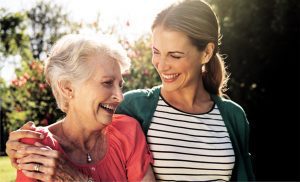 It is estimated there are 17 million cancer survivors in the U.S. today; yet researchers are just beginning to understand the complex issues that are a part of survivors’ lives. According to the National Cancer Institute (NCI), survivorship focuses on “ … the physical, mental, emotional, social and financial effects of cancer that begin at diagnosis and continue through treatment and beyond.” The goal throughout survivorship is to experience as high a quality of life as possible.
It is estimated there are 17 million cancer survivors in the U.S. today; yet researchers are just beginning to understand the complex issues that are a part of survivors’ lives. According to the National Cancer Institute (NCI), survivorship focuses on “ … the physical, mental, emotional, social and financial effects of cancer that begin at diagnosis and continue through treatment and beyond.” The goal throughout survivorship is to experience as high a quality of life as possible.
Most patients diagnosed with early-stage cancer can expect their overall health and functioning to return to near normal levels, while others with certain types of cancer and those diagnosed at later stages may face challenges physically and psychologically. Research from the American Cancer Society (ACS) shows that some survivors “ … may have difficulty returning to former roles, such as those in the workplace or as parents, or finding health or life insurance.”
While the end of successful cancer treatment is a time for celebration, it can also mean new challenges for survivors. Milestones such as returning to work, managing emotional issues, and the ongoing physical effects of cancer and treatment can also present unanticipated changes for patients and their families. The key to returning to a normal life after cancer treatment may be found in establishing new habits of diet and exercise or learning to cope with a range of emotional and physical challenges.
Nutrition and Exercise
Cancer survivors typically should turn first to their care team for information and advice about nutrition, physical activity and dietary supplements to improve quality of life and long-term survival. In times past, doctors often advised patients to rest and reduce physical activity to avoid fatigue associated with cancer and treatment. If patients experience pain, shortness of breath or rapid heart rate, this is good advice; however, recent research indicates that exercise during and after treatment can be safe and beneficial. Your cancer team is the best resource for beginning or resuming a more active post-cancer lifestyle, and they can refer patients and family caregivers to other professionals for a personalized post-treatment plan.
Physical and Emotional Challenges
The aftereffects of chemotherapy, surgery or radiation therapy should not be underestimated. Pain, fatigue and nausea are not unusual; more serious conditions include anemia, lymphedema (a buildup of fluid in fatty tissues just beneath the skin) and even severe infections. For both men and women, cancer and cancer treatment can cause changes in fertility and side effects in sexuality. Your oncology team is trained to monitor and manage the short- and long-term effects of treatment, so it’s important to discuss your concerns with your team and then follow their instructions.
The emotional side of cancer survivorship touches both patients and their families. The stress associated with a cancer diagnosis and the physical effects of treatment are often still fresh in memory. Survivors and their families can feel a complicated mixture of relief and worry about the future; some people suffer episodes of anxiety and even depression. All these are matters to discuss with your oncology team, who can help you achieve balance or refer you to another appropriate professional, if needed.
Healthcare After Cancer
In the rush to put cancer in the past, it’s important to remember that the end of treatment doesn’t mean the end of seeing your cancer team. Most often, long-term follow-up appointments and tests, followed by routine checkups and health screenings, will continue for many years. It’s important to keep your follow-up appointments and undergo tests and screenings as recommended by your oncologist. There’s no absolute certainty that seeing your oncologist will prevent cancer from returning, but it will help make sure that any recurrence is detected and treated early.
WORLD-CLASS CANCER
TREATMENT CLOSE TO HOME
Florida Cancer Specialists & Research Institute (FCS) has a statewide network of expert, board-certified physicians who bring world-class cancer treatments to local communities throughout Florida. FCS is also a strategic partner with Sarah Cannon, one of the leading research and clinical trial organizations in the world. This alliance provides FCS patients access to the newest, most innovative and most promising new treatments.
FCS treats patients with all types of cancer and offers a comprehensive range of services, including an in-house specialty pharmacy, an in-house pathology lab, financial counselors at every location and more. With world-class care that’s close to home, we deliver the most advanced and personalized care to our patients, every step of the way.
Florida Cancer Specialists
Ocala
1630 SE 18th St.
Suite 602
Ocala, FL 34471
Ocala Cancer Center
4945 SW 49th Place
Ocala, Florida 34474
For more information, visit FLCancer.com
 Central Florida Health and Wellness Magazine Health and Wellness Articles of the Villages
Central Florida Health and Wellness Magazine Health and Wellness Articles of the Villages



